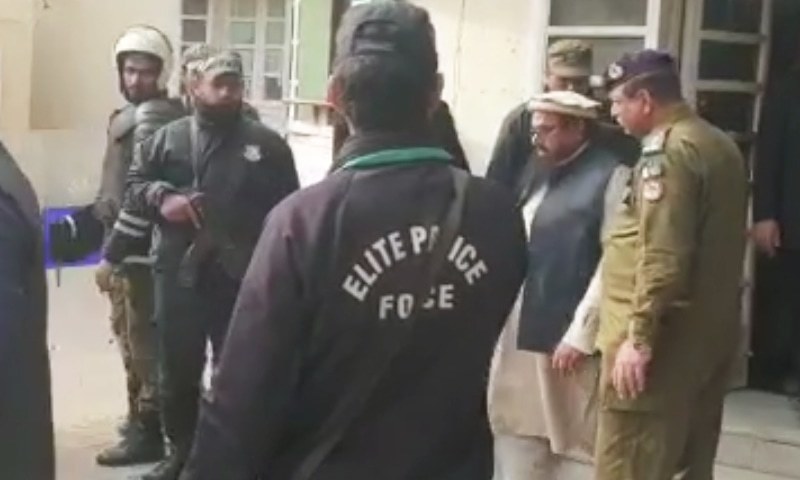Hafiz Saeed sentenced to five-and-a-half years in prison for terror financing

A Lahore anti-terrorism court convicted Jamatud Dawa leader Hafiz Saeed in two terror-financing cases on Wednesday.
He was slapped with a prison sentence of five-and-a-half years and a fine of Rs15,000 in each case. The sentences of both cases will run concurrently. The court also granted him the benefit of Section 382-B of the Code of Criminal Procedure (reduction of period of sentence of imprisonment). Malik Zafar Iqbal, the secretary of Al-Anfaal Trust, has also been convicted in the same cases and has been awarded similar punishment.
They were convicted under the Anti-Terrorism Act Section 11-F(2) — pertaining to membership, support and meetings relating to a proscribed organisation — and 11-N (punishment under Sections 11-H to 11-K).
Section 11H relates to fundraising for the purpose of terrorism, 11-I is about the use and possession of money or other property for terrorism, 11-J relates to funding arrangements which result in money being made available for terrorism, while 11-K relates to money laundering.


The court directed authorities to keep Saeed under custody until further orders.
The verdict was announced by ATC judge Arshad Hussain Bhatta. Saeed was also present in the courtroom while the judge read out the sentence.
The JuD leader was found guilty of “being part of a banned terrorist outfit” and for “having illegal property”, his lawyer Imran Gill told AFP.
“Hafiz Saeed and another of his close aides have been sentenced in two cases of terrorism financing,” prosecutor Abdul Rauf Watto told Reuters.
The court had reserved its verdicts in the two cases on February 6. Saeed is nominated in multiple cases pertaining to money laundering, terror financing and land grabbing.
Arrest and trial
The terror financing cases were filed by the Counter-Terrorism Department's (CTD) Lahore and Gujranwala chapters. The case filed by CTD's Gujranwala chapter was initially being heard in a Gujranwala ATC but was shifted to Lahore on the directions of the Lahore High Court.
During the trial of both cases, the court recorded the statements of 23 witnesses.
The JuD chief was arrested by CTD in July last year, while he was travelling from Lahore to Gujranwala. Prior to his arrest, 23 first information reports had been registered against JuD leaders, including Saeed and JuD Naib Emir Abdul Rehman Makki, at CTD police stations of Lahore, Gujranwala, Multan, Faisalabad and Sargodha in July 2019.
According to the CTD, JuD was financing terrorism from the massive funds collected through non-profit organisations and trusts including Al-Anfaal Trust, Dawatul Irshad Trust, Muaz Bin Jabal Trust, etc. These non-profit organisations were banned in April last year as the CTD, during detailed investigations, found that they had links with the JuD and its top leadership.
The crackdown on JuD last year followed a warning by Paris-based Financial Action Task Force (FATF) to Pakistan to deliver on its commitments to curb terror financing and money laundering.
The government had announced a ban on JuD and Falah-e-Insanyat Foundation (FIF) to partially address the concerns raised by India that Pakistan supported these and six similar organisations, including Jaish-e-Mohammad (JeM) or at least considered them low-risk entities.
Law enforcement agencies over the next few weeks had intensified their crackdown on JeM, JuD, FIF and other banned outfits, and arrested more than 100 activists. Nearly 200 seminaries besides hundreds of other facilities and assets associated with them across the country were taken over by the government.
Saeed, who in November 2018 was set free from a 300-day-long house arrest, has been repeatedly accused by the US and India of masterminding the 2008 attacks on the Indian financial capital that killed 166 people.
Saeed was declared a global terrorist by the US and UN over his alleged role in the Mumbai attacks. JuD is considered by the US and India to be a front for LeT, the militant group blamed for the attacks.
Additional input by AFP.















































